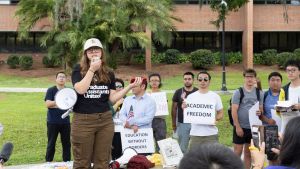
Covid-19 in China: From ‘Chernobyl Moment’ to Impetus for Nationalism
When Dr Li Wenliang died from Covid-19 on 7 February, the Chinese Internet saw an unprecedented outpouring of grief and anger. The universal mourning for the reprimanded doctor, who had warned his colleagues about a potentially infectious coronavirus in late December and had been silenced by authorities, was also an expression of the public anxiety and dissatisfaction with government responses that had accumulated over the few weeks since the outbreak began. The missteps and failures that had triggered widespread outrage ranged from the official downplaying of the risk of human-to-human transmission in the earliest days, to the shortage of personal protective equipment for medical workers; from the scandal of the Wuhan Red Cross in mismanaging the distribution of donated medical supplies, to the skyrocketing numbers of new cases and victims.
The situation was so grim and criticism from ordinary citizens so prevalent that some observers dubbed the crisis China’s ‘Chernobyl moment’ (Shih 2020b). However, as the epidemic has—at least for now—been brought under control, critical voices also seem to be fading away, even though anger lingers in Wuhan, where some dissidents are still fighting to resist the official victorious narrative (Kuo 2020; Weinland 2020). To be sure, it is difficult to know if and how the pandemic has influenced regime support in a country that regularly censors criticism, but discontent with epidemic responses has been largely subdued and nationalist sentiments have become more prominent. This holds true especially in those parts of China that have been much less impacted by the coronavirus—97 percent of all Covid-19 deaths in China occurred in Hubei province, where the epidemic started, while the rest of the country, with a population of over 1.3 billion, has recorded 121 deaths as of 30 April.
The relatively successful and prompt flattening of the curve, however, is not the only factor that contributed to the transformation of public sentiment. As in past crises that also evoked mounting criticism by exposing structural problems in the political system, the Chinese Party-state employs a set of ‘hard’ and ‘soft’ tools to suppress dissent and overcome the trust crisis. These include censorship, crackdowns on dissidents, bureaucratic and technocratic adjustment, and a tried-and-tested propaganda formula that I would call ‘disaster nationalism’. Yet unlike past disasters, such as the Sichuan earthquake of 2008, the global development of the pandemic and international power dynamics have also played a significant role in how Covid-19 has become an impetus for nationalism.
Authoritarian Resilience and Disaster Nationalism
Political scientists use the concepts of authoritarian resilience or responsive authoritarianism to describe the ways in which the Chinese regime allows a certain degree of participation and responsiveness without democratisation (Nathan 2003; Qiaoan and Teets 2020). In times of crisis, this responsiveness could mean rapid personnel changes to shift blame from the political system itself to individual local officials, technocratic improvement such as the reform of the epidemic control system following SARS, and strategies of political communication that respond to and incorporate public sentiments (Repnikova 2020).
The Party-state, for example, wasted no time in joining the public to pay tribute to Dr Li Wenliang, going as far as to officially recognise him as a ‘martyr’ (烈士). Right after his death, a technology company based in Beijing submitted a public sentiment analysis report to the government and offered recommendations on how to respond to the online outrage (Shih 2020a). The National Supervisory Committee sent a special team to Wuhan to investigate the matters related to Dr Li, and they unsurprisingly made the decision to revoke the reprimand and hold the relevant police officers accountable (Xinhua 2020). The pattern of punishing individual and local actors to ease anger and distract attention from structural problems within the system itself persists. Top Hubei and Wuhan officials were replaced in mid-February. After a prison in Shandong province was found to have covered up an outbreak, several figures—from the prison warden to responsible officials in the provincial government—were removed from office.
In terms of technocratic adjustment, there has been an ongoing debate on improving the epidemic response system and the management of public health crises, which has mostly focussed on legislation. The National Expert Panel on Covid-19 at the National Health Commission recruited two legal scholars in February (Fudan Public Health School 2020). In addition to calls for amending the existing Law on the Prevention and Treatment of Infectious Diseases, 17 other legal instruments in the field of public health will be amended or adopted (Wang 2020; NPC Observer 2020).
The particular mode of messaging and emotional mobilisation that the propaganda machine deploys in times of crisis is one of disaster nationalism. It is epitomised by a phrase former premier Wen Jiabao famously wrote on a school blackboard in Beichuan, the epicentre of the 2008 Sichuan earthquake: ‘Disasters regenerate a nation’ (多难兴邦). Narratives of disaster nationalism focus on heroic sacrifices of individuals as well as the cohesion of the national community. State media also celebrates the contribution of ordinary citizens more than usual, indicating a more human-centred and participatory approach that scholars have termed ‘authoritarian participatory persuasion’ (Repnikova and Fang 2018). People’s Daily, for example, launched a series called ‘Thank You, Every Ordinary Chinese Citizen’ (谢谢每一个平凡的中国人) on its social media channel, which quickly became a trending hashtag on Weibo, with over 570 million views at the end of April.
The idea of ‘being together in this’—shared feelings of pain, sadness, love, and inspiration—can be channelled towards reinforcing the sense of belonging to the imagined community (Anderson 2006). In his study of the responses to the Sichuan earthquake, Bin Xu (2009) notes how the event became a ‘televised spectacle of distant suffering’. With Covid-19 being the first pandemic in the age of social media, the spectacle of suffering, compassion, solidarity, and even boredom is mass produced in a much more personal, decentralised, and spontaneous way. While some videos get censored, there are many others that can serve the purpose of promoting national solidarity, which are quickly picked up by the propaganda apparatus—from moving love stories of dispatched medical workers to the beautiful moment where an elderly patient and a young doctor watch the sunset together. By curating social media content it is possible to add a humane touch to the grand narrative of the ‘war’ against the epidemic. Through the daily (re)telling of heroic and compassionate stories, and the constant chanting of the slogan ‘China, add oil!’ (中国加油!), dissatisfaction with the government can become subordinate to pride for the nation, of which the Party monopolises the representation.
The staging of a national mourning day on 4 April was a crystallisation of disaster nationalism. Having momentarily witnessed the power of mourning after the death of Dr Li Wenliang, what better way to tame this power than by turning it into an official ritual with members of the Politburo joining the rest of the country in mourning together at a designated time of a designated day? At that moment, mourning was no longer destabilising, but patriotic. Meanwhile, other subversive forms of remembering, such as the creation of digital archives of censored articles, continue to be suppressed (Li 2020).
The Perils of Binary Thinking
The relative success of the Chinese authorities in containing the outbreak in China and the mishandling of the pandemic in other countries, especially in Western democracies, have created an opportunity for the Chinese Party-state to change the narrative both domestically and globally—achieving more success with the former than the latter. In fact, when the Chinese government’s efforts to sell its preferred story on the international stage backfired, suspicion and hostility from the West further enhanced nationalism at home.
It comes as no surprise that a hostile international environment boosts nationalism. The Chinese public often assumes that accusations from Western governments are in bad faith, especially when such international actors were silent while many in China were themselves furiously criticising the government for cover-ups and incompetence in late January and early February. The online backlash against the scheduled publication of Fang Fang’s Wuhan Diary in English and German is a perfect example of how the debate quickly became distorted by binary thinking, i.e. the assumption of a binary opposition between a homogeneous China and a homogeneous ‘West’ (The Economist 2020). Netizens who attack her ruthlessly claim that even though some part of the diary might be true and fair, the translation of her work for a Western audience means betrayal and cozying up to ‘foreign hostile forces’ (境外敌对势力)—a term frequently used by both state media and the general public in China to delegitimise local social movements and grassroots activism as stemming from foreign influence.
My previous research on right-wing populist discourse on Chinese social media also highlights this strategy of ‘externalising the domestic and internalising the international’ in official and popular communications (Zhang 2019). When binary thinking dominates the discussion, any criticisms of the government can be dismissed as intentionally or unintentionally ‘helping the enemy’.
The nationalist right in Western societies are informed by the same binary thinking that views the pandemic as a power game of winners and losers. Some resort to xenophobia and racism, which not only hurt Asian communities in those societies, but also help the Chinese government and ‘wolf warrior’ nationalists to perpetuate the narrative of foreign hostile forces (Shi and Liu 2019). While hawks on both sides feed into each other by scapegoating the foreign other for domestic failures, progressive politics everywhere must resist subjecting democratic struggles against inequality, injustice, and state violence to the logics of right-wing nationalism and geopolitical competition.
Lastly, although nationalistic sentiments now appear to be prevalent in discussions about Covid-19 in China, the diversity of opinions and the creative expression of criticism despite strict censorship should never be underestimated. Representing the country as a monolithic whole and disregarding the agency of its citizens are key components of the binary thinking critiqued above.
Photo: Flag at half-mast in Tiananmen Square on 4 April 2020 to commemorate those who died in the fight against Covid-19. PC: Ju Huanzhong, Xinhua.
Bibliography:





